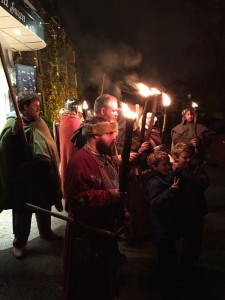 Conferences can be stimulating, fun or exhausting, or possibly all three. It’s wise to prepare beforehand, not just your travel tickets and hotel bookings, but which sessions you want to go to. Then you find out you want to go to all of them. Then you discover the conference clashes with a promised speaking engagement. Conferences can be stimulating, fun or exhausting, or possibly all three. It’s wise to prepare beforehand, not just your travel tickets and hotel bookings, but which sessions you want to go to. Then you find out you want to go to all of them. Then you discover the conference clashes with a promised speaking engagement.
Okay, let’s do both.
Harrogate History Festival started dramatically enough with a Viking invasion last Thursday evening, The Ormsheim Vikings, a Dark Ages reenactment group brought fire and presence to The Old Swan Hotel.
This was followed by Bernard Cornwell presenting the Historical Fiction Writers’ Association debut fiction award to Kate Worsley for She Rises. At the party afterwards, I was really brave and spoke to some of the Vikings…
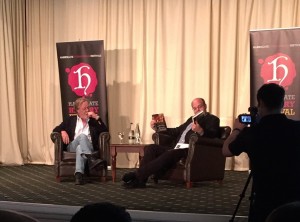 “So is this book any good, then?”
Bernard Cornwell’s interview with arts broadcaster Mark Lawson jump-started Saturday morning. Nobody tells politically incorrect, but riveting stories like Bernard Cornwell does.
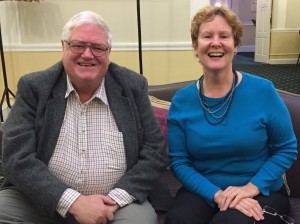 With John Jackson
During the interval, I was grabbing a cup of coffee, when I heard a voice say, ‘Hello Alison.’ It was John Jackson, Romantic Novelists’ Association friend and reader and Twitter friend. Living locally, he’d popped in to hear Bernard Cornwell.
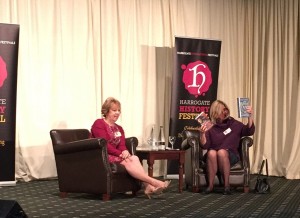 Elizabeth Chadwick and Vanora Bennett
Writing friend Elizabeth Chadwick was up next, interviewed by Vanora Bennett and talked about her writing life, methods, research and next book in her Eleanor of Aquitaine series. Approachable and friendly in her manner, Elizabeth gave us insights in both an entertaining and informative way. You can find her research photos, sample book sentences and reading choices on her daily Facebook posts – she loves social media!
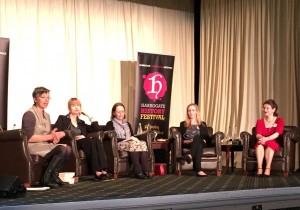 Manda (MC) Scott introducing the shortlistees Dipping out at this stage to chat to a couple of friends and mooch around the bookshop, I went back after lunch to hear from the debut award shortlistees about how they started, their research, themes and the experience of the first novel. Interesting there was nothing before the 18th century…
Alison Weir and Sarah Gristwood picked up the thorny and well as evergreen(!) subject of Richard III and the princes in the Tower, but from the point of view of the women involved – Elizabeth Woodville, Cecily Neville, Margaret Beaufort and Elizabeth of York. The answer still isn’t as clear as it could be…
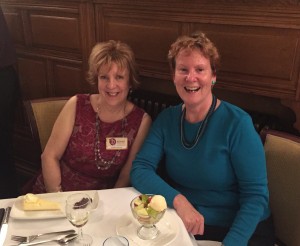
At dinner Elizabeth Chadwick and I compared notes on the day’s events, books, publishing and how to solve the world’s problems.
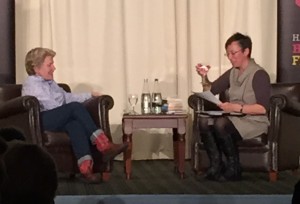 Sandi Toksvig and Manda Scott
Friday ended on a comedy high as Sandi Toksvig was interviewed by festival organising chair, Manda Scott. Sandi had to choose eight books she would take to the fictional desert island.
Now read the second part of my histfest report.
Alison Morton is the author of Roma Nova thrillers, INCEPTIO, and PERFIDITAS. Third in series, SUCCESSIO, is now out.
Find out about Roma Nova news, writing tips and info by signing up for my free monthly email newsletter.
If you enjoyed this post, do share it with your friends!Like this:Like Loading...
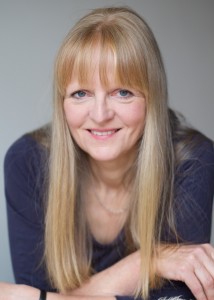 Ruth Downie read too much Jane Austen at university, emerged with an English degree and a plan to get married and live happily ever after. As a backup she learned typing and shorthand, in the mistaken beliefs that people would always need secretaries and that she might be quite good at it. Finally escaping into fiction, she won the Fay Weldon section of the BBC’s End of Story competition in 2004. Ruth Downie read too much Jane Austen at university, emerged with an English degree and a plan to get married and live happily ever after. As a backup she learned typing and shorthand, in the mistaken beliefs that people would always need secretaries and that she might be quite good at it. Finally escaping into fiction, she won the Fay Weldon section of the BBC’s End of Story competition in 2004.
The first book in her crime series featuring Roman Army medic Ruso and his British partner, Tilla, was a New York Times bestseller under the title ‘Medicus’. It was published as ‘Ruso and the Disappearing Dancing Girls,’ in the UK, where The Times recommended it as one of their ‘Seven best thrillers for Christmas’. The sixth in the series, ‘Tabula Rasa,’ is published this year. She is currently working on the next book and also spends several weeks every summer wielding an archaeological trowel in search of inspiration.
Welcome Ruth! We first met on Helen Hollick’s ‘The Wonder of Rome‘ blog hop last year. You wrote a great post called ‘First drown your ape‘ about Roman doctors. I love your grumpy hero, Ruso. Tell us more about him…
On arrival in Britannia, Gaius Petreius Ruso’s needs are simple. All he wants
1. is to get on with his job as a medic in Rome’s Twentieth Legion, and thus
2. clear a few family debts.
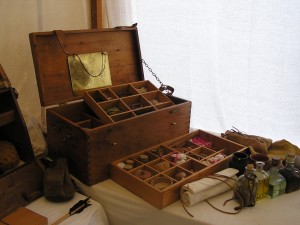 Roman Medical chest (Reconstruction) He doesn’t need – or want –
1. an injured British slave girl with a name he can’t pronounce
2. her opinions
3. anyone else’s opinions
4. any unexplained dead bodies, because it certainly isn’t his job to pursue whoever killed them.
Unfortunately, the Roman Empire is a violent place, and the gods don’t care what Ruso wants. They have more interesting plans…
Do you think historical accuracy matters in a historical novel? And connected to that, do you think fiction does anything to help us understand the past, or is it purely entertainment?
I’m sure historical accuracy is important, but I’ve lived long enough to learn that “truth” is a slippery word. Today’s accepted facts can be swept aside by tomorrow’s shiny new theory, and if you think ‘history’ is done, dusted and settled, then you and I haven’t been reading the same books.
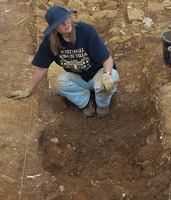 In the trenches Archaeology, you’d think, should be safe. After all, you can see it, touch it and photograph it. However, I’m mightily glad I never wrote that short story about the poignant ceremony where the soldiers of Maryport buried their stone altars and then marched away, never to return. The area has been re-examined since I visited, and we now know that the altars weren’t reverently buried at all. They were dumped in foundation pits as hard core.
Written evidence is tricky too. Even if we have the ‘facts’ straight, we all naturally choose to record the parts of a story that strike us as important. That’s why we know so much about the lives and opinions of wealthy men in the classical world, and so little about their slaves, or about the many women who neither married a famous man nor murdered one.
Meanwhile, the ancient Britons steadfastly refused to write anything down, so all we have is the opinions and inventions of their conquerors. And archaeology, of course. Which is, as we know, open to interpretation.
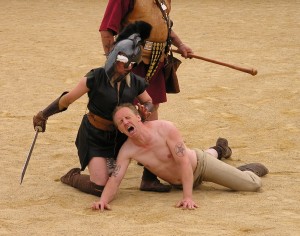 Violence as entertainment – Chester Roman Festival, 2011 Strangely, attitudes are easier to pin down. I don’t know anyone who would dispute that, under the Roman empire, slavery was normal, women were generally deemed to be less intelligent than men, and violence was frequently entertaining.
Of course, some writers will deliberately choose to be “inaccurate” – altering and augmenting the stories most of us believe about our past. Others – and I’m one of them – would rather work within the currently accepted facts about our chosen period. Certainly, the scarcity of information about Britain in the early second century is such that it leaves plenty of room for invention. We know that Roman soldiers were allowed to form partnerships with local women, and we know there was some sort of rebellion in the early years of Hadrian’s reign, but we have no details. Only in fiction can we feel the torn loyalties of a soldier’s girlfriend, or the mistrust between the occupying forces and the locals.
 A source for a remedy? Imagination aside, there’s marvellous material from beyond these shores to decorate the gaps between the evidence. Ruso regularly refers to genuine medical recipes from the ancient world. Constrained by accuracy, I’ve never yet written any scorpions into Britannia. If one ever appears, I shall instantly write a pile of dried donkey manure, drop some into a cup of wine and stir well before offering this authentic remedy to its unlucky victim.
I think the best we writers can do (and heaven knows, most of us aren’t historians, so we’re constantly playing catch-up) is to love our chosen era enough to immerse ourselves in the research and try to create something that seems authentic at the time. Something that, crucially, we ourselves believe in. We’re bound to get some things wrong. For that, we apologise. It’s only fiction, after all.
Thank you, Ruth. I don’t think I’ll be going near any scorpions in the near future…
Find out more about Ruth: www.ruthdownie.com
Twitter: @ruthsdownie
Facebook: Ruth Downie Ruso and Tilla
Ruth’s latest book, Tabula Rasa is officially out today! (23 October)
 Ruso and his wife Tilla are stationed in the borderlands of Britannia, helping to tend the builders of Hadrian’s Great Wall. Ruso and his wife Tilla are stationed in the borderlands of Britannia, helping to tend the builders of Hadrian’s Great Wall.
Having been forced to move off their land, the Britons are distinctly on edge, and are still smarting from the failure of a recent rebellion that claimed many lives. Then Ruso’s recently arrived clerk, Candidus, goes missing. A native boy thinks he sees a body being hidden inside the wall’s half-finished stonework, and a worrying rumour begins to spread.
When the soldiers ransack the nearby farms looking for Candidus, Tilla’s tentative friendship with a local family turns to anger and disappointment – and then a child vanishes in the company of a lone, unidentified solder.
As tensions rise between the Britons and the Romans, Ruso must find the missing boy before it’s too late.
Amazon UK Amazon US
Updated 2019: Alison Morton is the author of Roma Nova thrillers INCEPTIO, PERFIDITAS, SUCCESSIO, AURELIA, INSURRECTIO and RETALIO. CARINA, a novella, and ROMA NOVA EXTRA, a collection of short stories, are now available. Audiobooks are available for four of the series.
Find out more about Roma Nova, its origins, stories and heroines… Download INCEPTIO, the series starter, FREE as a thank you gift when you sign up to Alison’s monthly email newsletter.
If you enjoyed this post, do share it with your friends!Like this:Like Loading...
 Sitting by yourself in a spare bedroom, study, or even at the dining room table, and tapping away on a keyboard can be a lonely business. People wonder why you don’t go outdoors on a sunny day or wander into the village for a leisurely drink at the local bar or browse around the market. But you don’t want to see, let alone talk, to other people. You are absorbed in your writing world. Sitting by yourself in a spare bedroom, study, or even at the dining room table, and tapping away on a keyboard can be a lonely business. People wonder why you don’t go outdoors on a sunny day or wander into the village for a leisurely drink at the local bar or browse around the market. But you don’t want to see, let alone talk, to other people. You are absorbed in your writing world.
Of course, you need to get the word count or the hours in on your latest work in progress – that’s understood. But why do you need to interact with other people? Ninety-six percent of people aren’t interested in writing or in your latest work, you mutter to yourself. When you reply honestly to the enquiry about how your writing is going, you’ve watched their eyes glaze over. But of that four per cent who are interested, many are writers and you need to find them. Why?
- Your mental health – you are a human being who needs contact with like-minded souls
- Learning from others’ experiences – competitions, agents, the ever-increasing number of routes to publication, conferences, writing and book events
- Getting critiques from other writers – not Auntie Maud who taught English or your mate at work
- Learning new writing techniques and approaches to work – not just how to sling words together, but about characterisation, the senses, novel or poetry structure, research and, increasingly, technology
- Networking to make those vital contacts to assemble a team of editors, cover designers, formatters and/or publishers
- Not boring your nearest and dearest
 Colleagues at the RNA Conference So where are these fellow-writers? Starting locally, try and find a writing group. Look in the local press, the library and online. Ask anybody who has a faint connection with writing. Ask at your local book club – some of them may be writers. Have a chat to the organiser and go and try out such a group. The main requirements are a supportive open atmosphere, honesty and a lack of ego-tripping.
Next are writing associations, usually specific to a genre of writing, such as the Romantic Novelists’ Association or the Historical Novel Society. They have events, regional groups, newsletters, Facebook pages, websites, blogs – you name it! If you are thinking of self-publishing nothing beats the camaraderie of the Alliance of Independent Authors (ALLi). Even remotely, you can benefit enormously.
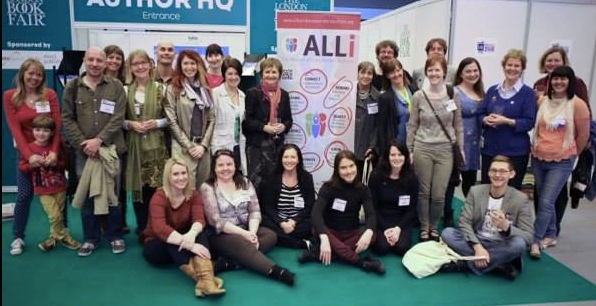 ALLI authors meet up at the London Book Fair April 2014 Online critique groups can be a little daunting at first, but as you grow a writer’s thick skin, you’re likely to find it helpful and inspiring as well as immensely valuable. But you’ll need to plunge in!
Going to conferences can be a real boost to your writing. There are hundreds of literary festivals each year in the UK, including more practical ones for writers such as the Jericho Writers events where you can meet fellow writers, agents and publishers. Moreover, you may hook up with another writer you can develop into a writing buddy, or more formally, critique partner. With Skype and email it’s no problem to discuss and work on writing together at distance. The writing buddy must be someone you trust, so it may take a little while to get to know them. Mine has kept me sane and grounded over the years so they’re worth their weight in gold!
Updated 2024:
When you get to know other writers, you can take part in a joint writing retreat. I’m just back from one. Apart from time for conversations and exchanges on every subject connected with writing, excursions to inspiring places and sharing writing problems, I’ve added a few thousand words to my next project and feel energised to add the next thousand.
Happy writing!
Alison Morton is the author of Roma Nova thrillers – INCEPTIO, CARINA (novella), PERFIDITAS, SUCCESSIO, AURELIA, NEXUS (novella), INSURRECTIO and RETALIO, and ROMA NOVA EXTRA, a collection of short stories. Audiobooks are available for four of the series. Double Identity, a contemporary conspiracy, starts a new series of thrillers. JULIA PRIMA, Roma Nova story set in the late 4th century, starts the Foundation stories. The sequel, EXSILIUM, is now out.
Find out more about Roma Nova, its origins, stories and heroines and taste world the latest contemporary thriller Double Identity… Download ‘Welcome to Alison Morton’s Thriller Worlds’, a FREE eBook, as a thank you gift when you sign up to Alison’s monthly email update. You’ll also be among the first to know about news and book progress before everybody else, and take part in giveaways.
If you enjoyed this post, do share it with your friends!Like this:Like Loading...
 Talking online with some colleagues about historical and alternative historical writing, the conversation inevitably turned to research and how it was woven in or dripped into the story. We all declaimed against the dreaded info dump when the poor reader gets a JCB bucket size load of history book content poured on them. But how much period or descriptive detail is the right amount? Talking online with some colleagues about historical and alternative historical writing, the conversation inevitably turned to research and how it was woven in or dripped into the story. We all declaimed against the dreaded info dump when the poor reader gets a JCB bucket size load of history book content poured on them. But how much period or descriptive detail is the right amount?
I’m the minimalist type like many thriller writers. I give the reader enough to form their own picture of where and what, and to see the bare winter trees or sniff the air. Writers must also include some elements of backstory and context or the reader doesn’t feel engaged. But it should relate to the narrative of the story and not be there because the writer has done some wonderful research.
So far, so normal.
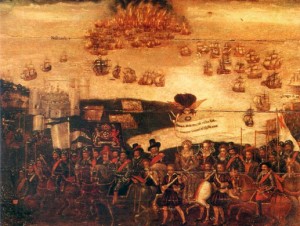 Elizabeth I at Tilbury facing the Spanish Armada But there’s another strong factor to consider: what type of tone and style is the story? Is it literary, a learned, almost non-fiction in its meticulous portrayal of a dramatised version of documented history or an adventure, action story where plot is the main driver or a romantic story or saga where the lives of the characters are the focus of the book? Is the writer seeking to bring in every detail of events of the period and their effect on history, to describe every hook, lace and braid, or to draw some universal truth, lesson or interpretation about people by playing their story out as it may have happened in a past era, or to engage them in a very personal and emotional story which happens to have a historical setting? Or to describe technological change in detail, or social revolution? Or a mixture of any of these?
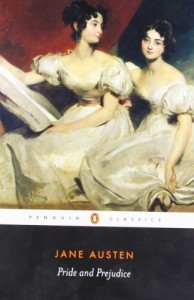 Whilst I dislike deliberately ignored or changed important facts such as who won a battle or married a different prince, and am irritated by smaller ones that can be easily checked such as purple fabric dye or potatoes, I’m not a historical fiction snob. Historical-lite is as valuable as historical-serious as long as it’s well done. Stories about great events written in a high style prose appeal to some ‘histfic’ readers; others enjoy personal stories, military tales or Regency fluff. Whilst I dislike deliberately ignored or changed important facts such as who won a battle or married a different prince, and am irritated by smaller ones that can be easily checked such as purple fabric dye or potatoes, I’m not a historical fiction snob. Historical-lite is as valuable as historical-serious as long as it’s well done. Stories about great events written in a high style prose appeal to some ‘histfic’ readers; others enjoy personal stories, military tales or Regency fluff.
Historical fiction embraces many types and tastes. Some write about people, some about stuff, some about a mixture of both. And it’s always the reader’s choice what they pick up and read.
Alison Morton is the author of Roma Nova thrillers, INCEPTIO, and PERFIDITAS. Third in series, SUCCESSIO, is now out.
Find out about Roma Nova news, writing tips and info by signing up for my free monthly email newsletter.
If you enjoyed this post, do share it with your friends!Like this:Like Loading...
 I am absolutely delighted to have become an author member of the International Thriller Writers. I am absolutely delighted to have become an author member of the International Thriller Writers.
*Happy dance around the office*
The presidents are M J Rose and Lee Child and their membership list includes James Patterson, Clive Cussler, Karin Slaughter, Peter James, Kathy Reichs, Ken Follett and many many other wonderful adrenaline-bursters like Adrian Magson and Mari Hannah.
In their own words…
“ITW represents professional thriller authors from around the world.
The International Thriller Writers is an honorary society of authors, both fiction and nonfiction, who write books broadly classified as “thrillers.” This would include (but isn’t limited to) such subjects as murder mystery, detective, suspense, horror, supernatural, action, espionage, true crime, war, adventure, and myriad similar subject areas.
ITW’s mission is “To bestow recognition and promote the thriller genre at an innovative and superior level for and through our Active members; to provide opportunities for mentoring, education and collegiality among thriller authors and industry professionals; and to grant awards for excellence in the thriller genre.” ITW By-laws: Article II, Purposes, Section 2.
One of the main purposes of the organization is to provide a way for successful, bestselling authors to help debut and midlist authors advance their careers. To that end, ITW has designed numerous, effective programs and events which promote debut and midlist writers and their work, sometimes in partnership with bestselling authors.
In addition, ITW promotes literacy, gives money to worthy organizations, supports libraries, and advances the genre. Finally, it brings together almost a thousand writers, readers, publishers, editors and agents at its annual conference, ThrillerFest, as well as at CraftFest, a writing workshop program, and AgentFest, where aspiring authors can meet and pitch top literary agents.
Today, ITW counts over fifteen hundred members from around the world whose cumulative book sales total almost three billion copies. “Our members come from a diverse range of the thriller genre, fiction and nonfiction, including suspense, mystery, horror, detective, espionage, legal, medical, science, true crime, adventure, supernatural, romantic suspense, historical, and young adult—and the list keeps growing.”
I think I’ve just introduced a new part of the genre with the Roma Nova thrillers!

You can subscribe to the online magazine The Big Thrill packed with news, author interviews (e.g. Val McDermid interviewed by JF Penn), book spotlights and round table discussions (e.g. “Do readers prefer and ageless protagonist?” or “Do writers strive too hard for unusual methods of murder and what are some of the most memorable?”).
If all goes to plan, I’ll be in the US next summer, so I may well be going to Thrillerfest in New York in July!
Alison Morton is the author of Roma Nova thrillers, INCEPTIO, and PERFIDITAS. Third in series, SUCCESSIO, is now out.
Find out about Roma Nova news, writing tips and info by signing up for my free monthly email newsletter.
If you enjoyed this post, do share it with your friends!Like this:Like Loading...
|
Subscribe to Blog via Email
Join 50 other subscribers.
Categories
Archive
|
 Conferences can be stimulating, fun or exhausting, or possibly all three. It’s wise to prepare beforehand, not just your travel tickets and hotel bookings, but which sessions you want to go to. Then you find out you want to go to all of them. Then you discover the conference clashes with a promised speaking engagement.
Conferences can be stimulating, fun or exhausting, or possibly all three. It’s wise to prepare beforehand, not just your travel tickets and hotel bookings, but which sessions you want to go to. Then you find out you want to go to all of them. Then you discover the conference clashes with a promised speaking engagement.





























